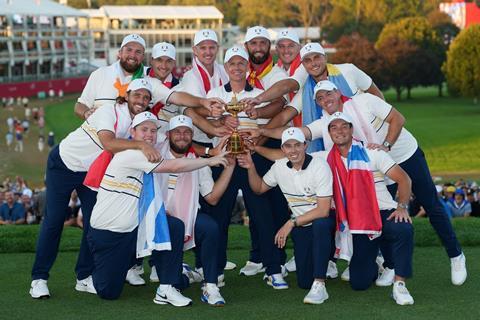Europe’s dramatic victory in the Ryder Cup was sport at its finest - and its most toxic. As fans hurled abuse and players showed grace, the tournament revealed competition’s power to both glorify and corrupt, says Jonny Reid

Europe won the Ryder Cup 15–13 on Sunday evening.
Those nine words conceal a wealth of drama: one of sport’s greatest comebacks narrowly thwarted, twelve individuals forged into a team, and normally sedate golf crowds transformed into fervent fans. The Ryder Cup draws us in like little else: national pride, elite skill, high stakes and visible emotion create a compelling spectacle.
For me, watching this year’s contest was both deeply enjoyable and profoundly uncomfortable. The thrill of competition sat alongside the shame of fans’ behaviour - especially on Saturday, when some of the most abusive scenes in professional sport played out.
As a fan, I felt conflicted. Should I enjoy European players biting back at the crowd? Why was I feeling such animosity towards the American team because of a minority hurling insults?
This tension drove me back to the Bible’s vision of competition.
The good: Sport as God intended
Why does elite sport engage us so deeply? Partly because it offers unfiltered drama: in a world of fake news and curated lives, sport gives us something real. People excel in their craft under pressure, and in the Ryder Cup we see the added beauty of team sport, as individuals sacrifice their ego for a collective goal. As theologian Wayne Grudem notes, God made humans with a drive “to improve, to compete, to develop skills,” that reflect his own creativity and excellence. Competition itself is not a problem; it’s a God-given impulse that can glorify him.
This year, Europe won away from home for the first time since 2012 in the cauldron of New York. Watching or playing sport with others is one of God’s good gifts. It teaches us about the world he has made and can move us to praise him. The communal aspect, with players relying on each other and fans singing together, is integral to that gift. Europe’s team contained golfers from multiple nations, languages and cultures - yet bound together for one purpose. That selflessness is beautiful. Whether or not someone follows Jesus, there is real joy in this community. As Acts 14:17 reminds us, such moments are gifts of common grace given to all.
The Ryder Cup shows both the splendour and the stain of human competition
This weekend also showed glimpses of competition at its best: golfers spurring each other to use their talents fully for the joy of others. After victory was assured, players spoke warmly of their opponents. Tyrell Hatton praised the Americans’ “incredible fight.” US captain Keegan Bradley was magnanimous in defeat, calling Luke Donald “probably the best European captain of all time.” Scottie Scheffler praised his teammate Bryson DeChambeau saying: “I don’t think I could have done what I did in my match today if he didn’t do what he was doing in front of me.”
Moments of elation, camaraderie and mutual respect point, imperfectly, to the world to come, where we will work together in harmony using God-given gifts and join the ultimate crowd worshipping him. Like lifelong competitors Jacob and Esau meeting and one saying: “To see your face is like seeing the face of God” (Genesis 33:10), sport can give fleeting glimpses of God’s image in an opponent - if we have eyes to see.
Sport can also form character. As Rory McIlroy said after winning: “Golf has the ability to unite people, it teaches you life lessons, it teaches you how to play by the rules, how to respect people.”
He wasn’t finished though. “Unfortunately, sometimes this week we didn’t see that.”
The bad: idolatry
Ultimately, this Ryder Cup may be remembered less for Europe’s excellence than for the abuse hurled at players both on course and online, in words and song. As many commentators noted, sportsmanship tipped into outright hostility. Sport often acts like a mirror - into cultures and into our own hearts - and for much of the last few days, it wasn’t a good look.
Good gifts like sport can become gods. I found myself unhealthily obsessed with the tournament this weekend. We can easily replace God with our fandom. Bethpage Black golf course could almost have been a cathedral: thousands united for a cause, singing their hearts out. But sport is a terrible place to seek ultimate identity and joy. Its unpredictability makes it exhilarating to watch but devastating to rely on. As Romans 1 warns, created things are bad gods. For the fans hurling abuse this obsession led to a dehumanisation of the opposition through song and words.
The ugly - our tongues, online and on course
In church on Sunday afternoon (resisting the urge to check the score), I reflected on the formative power of communal worship. In it we shape and are shaped - encouraging each other and praising God. The same is true, in a darker way, of crowds chanting abuse. The terrace chant “You only sing when you’re winning” contains a kind of unintended truth: what we sing reveals and reinforces what we love.
As a fan, I felt conflicted. Should I enjoy European players biting back at the crowd?
It becomes easy to turn someone made in God’s image into just another target. Witty songs, good-natured banter and passionate support are part of sport’s beauty, but dehumanising language is not. The emotion on players’ faces after victory showed how deeply words cut. This wasn’t banter, this was abuse.
Being in church also reminded me of why attending a church - where you are physically known - week by week really matters. In a stadium crowd or online, anonymity removes accountability; I can say what I like and never be challenged. At church though, I cannot hide. I am known, loved and, in corporate worship of someone worthy of my worship, shaped and formed into his likeness.
James writes: “With the tongue we praise our Lord and Father, and with it we curse human beings, who have been made in God’s likeness…My brothers and sisters, this should not be” (James 3:9–10). Whether online, in the stands or in the pub, Christians are called, as Paul puts it, to speak “only what is helpful for building others up” (Ephesians 4:29). Take that seriously and many of us would say far less. I know I would.
A chance to be distinct
The Ryder Cup shows both the splendour and the stain of human competition. As Christians we can delight in its beauty without denying its brokenness. We can model a better way: passionate but gracious, competitive yet humble, vocal but constructive. And we can let these glimpses of glory lift our eyes beyond the fairways to the one who gave us sport in the first place, and who alone can satisfy the longings it awakens.
Sport provides a mirror for our hearts. It reveals what we love and where we need growth. But it also acts as a signpost to a time when competition will be without contempt, fan culture without abuse and singing without scorn. In that future, the joy and unity glimpsed in sport will be perfected - and every crowd will sing to the one who truly deserves it.






































No comments yet